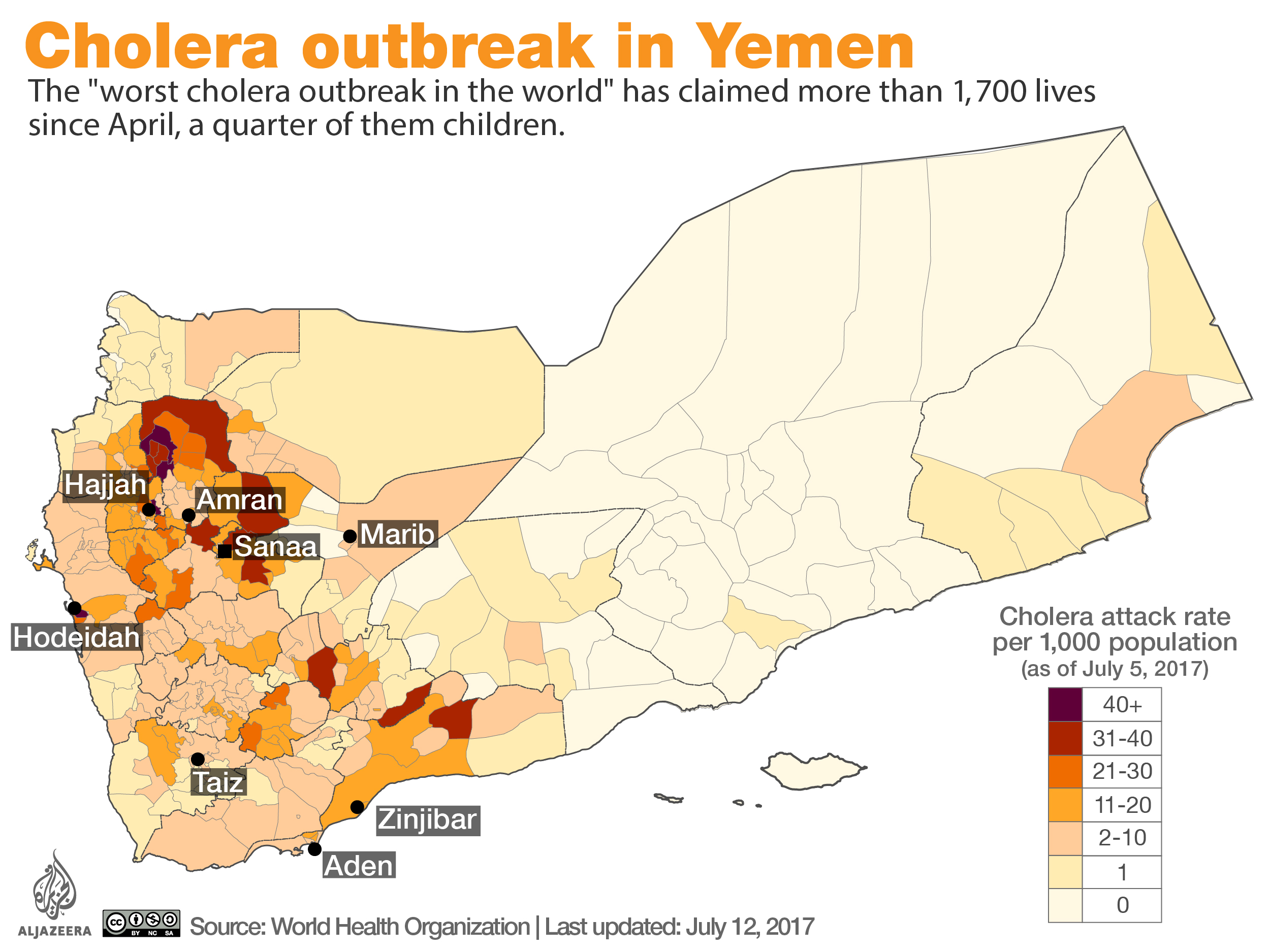Iranian Shiite Crescent
"The average person [in war torn Yemen] lives on tea and bread. It's just one meal a day."
"They are in a weakened state, and that is why they are getting sick [in the cholera epidemic outbreak]."
Jamie McGoldrick, UN humanitarian coordinator, Yemen
"People will continue to get sick, and they will always be treated like cattle here."
"The international community should just make people stop fighting and help our hospitals."
Aziz Ramadan, Yemeni Coast Guard officer

It's a telling phenomenon, that in the Middle East the enmities of ages past relating to tribal, clan, ethnic, sectarian and political violence is never far from the surface. From time to time unappeasable rage from one group to another bubbles up and hatred grows, nourishing bloodlust and conflict. In this century the Middle East has become accustomed to looking to the 'international community', and more singularly, the United States, to intervene and miraculously produce if not peace, then a temporary hiatus between peace and war.
Without such intervention they feel persecuted and deadlocked in arriving at any workable solution of their own invention whereby they might all live in peace with one another. Their passions, so close to the surface appear resistant to reason. That basic human rights should be the inheritance of all people anywhere and everywhere appears to elude their consciousness. And so, they inflict misery and carnage upon one another through their abrasive denunciations, threats and violence.
The one country that, under its current heightened fundamental Islamism appearing to initiate much of the hostile reaction that permeates the region is the Islamic Republic of Iran, with its glowering ayatollahs inflicting misery not merely in the region but far afield. Shiite Persia considers itself superior and closer to the Almighty than its Arab neighbours, most of whom practise Sunni Islam, representative of the majority of Muslims anywhere in the world.
Envisioning itself the ultimate authority on Islam and nourishing its ambitions to replace the command of Saudi Arabia as the custodian of the two most sacred sites in Islam, Mecca and Medina, Iran has been engineering a Shiite triangle as a power source with itself at the helm, to gain the legitimacy of authority and power that it craves and feels is rightfully its own. It has succeeded in alienating the Arab world against its machinations, and it has given the wider international community ample reason to suspect its ambitions go wider afield than the Middle East.
It is undeniably involved in creating and supporting terrorist groups to do its bidding both in the region and internationally. Iran's authority in Iraq, Syria, Lebanon (where its proxy jihadist militia Hezbollah holds sway) and Yemen, and the support it receives from Qatar, has it poised, alongside its growing thrust in ballistic missile and nuclear warhead enterprise, to present as the ultimate power in the Middle East. Its links to North Korea's nuclear and ballistic missile program gives the lie to its constantly-assuring critics it has only peaceful aspirations.
Iran's meddling in Yemen's politics, spurring the Shiite Houthi rebels to challenge the country's Sunni government has brought the impoverished nation into a state of vicious conflict. The country's damaged infrastructure and state of war has brought it to an even greater degree of destabilization. Half of its 27 million people have no access to clean water and two-thirds lack enough food. Their state bordering on mass malnutrition has made the population vulnerable to cholera, which has become epidemic.
At least 269,608 people in Yemen in 21 of its 22 provinces have been infected with cholera, with 1,624 dying of the bacterial infection caused by feces-contaminated water that modern sanitation and water systems have eradicated elsewhere in the world. Treatment is simple enough with rehydration solutions and sometimes antibiotics, but in Yemen where structures and systems are overburdened and supplies short and medical facilities destroyed by bombing mostly from Saudi Arabian-led forces, the situation is dire.
Clinics that remain struggle to cope. The state is so poor civil servants were no longer being paid and sanitation workers went on strike. Lack of garbage collection caused septic backups contaminating water wells, and when dirty rainwater polluted the wells even more, it was inevitable that cholera would ensue. The United Nations requires $2.1-billion for humanitarian relief in Yemen, easily supplied by a wealthy country like Qatar, but the UN remains reliant on the international community.
Iran, which began the conflict leading to this dire humanitarian crisis, has other fish to fry, destabilizing the world order alongside North Korea. The coalition of Sunni-majority Arab nations in the Middle East has embarked on a disagreement with Qatar for its support and friendship with Iran and in the process they are now divided, leaving Iran dismissive of their claims, content to see its enemies in a state of disarray.
Labels: Conflict, Disease, Iran, Middle East, Saudi Arabia, Shiite, Sunni, Yemen

<< Home